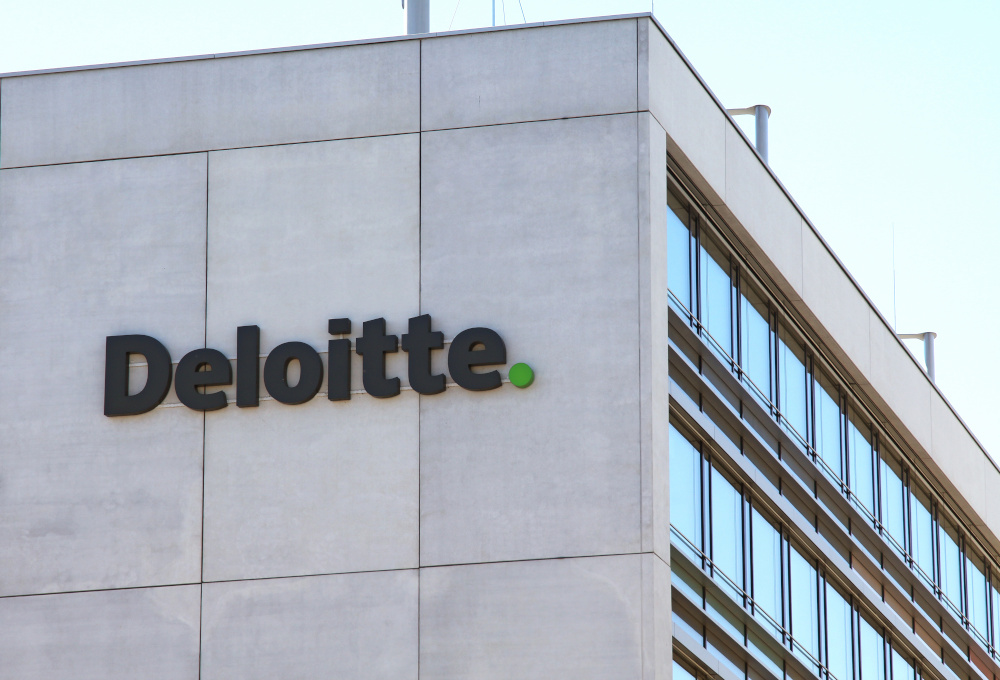CFOs predict business demand will not recover until after Q2 2021
Finance leaders continue to rank the effects of the COVID-19 pandemic as the top risk to their businesses, followed by rising geopolitical issues and the effects of Brexit, according to Deloitte’s latest CFO survey.

Pictured: Deloitte's offices in Nurnberg, Germany. (Credit: doganmesut - stock.adobe.com)
Almost two-thirds (62%) of CFOs do not expect demand for their own businesses to recover to pre-pandemic levels until after Q2 2021, up from just under half (49%) in Q2’s survey.
The Deloitte CFO survey for Q3 2020, which gauges sentiment amongst the UK’s largest businesses, took place between 22nd September and 6th October 2020.
A total of 102 CFOs participated in the latest survey, including CFOs of 21 FTSE 100 and 37 FTSE 250 companies. The combined market value of the UK-listed companies that participated is £417 billion, approximately 20% of the UK quoted equity market.
Perceptions of external uncertainty remain elevated and well above levels seen before the pandemic, with the majority of CFOs surveyed (79%) feeling there is a high or very high level of uncertainty facing their business, in line with Q2 (80%).
Almost two-thirds (63%) of CFOs expect inflation to remain between 0.1–0.5% over the next two years, up from 39% in Q2. Over half of finance leaders (57%) also expect the base rate to be maintained at 0.1% this time next year, with only 6% anticipating negative interest rates in a year’s time.
Over three-quarters of finance leaders (78%) expect UK corporates to reduce capital expenditure in the next 12 months, maintaining the sentiment seen in Q2, where the majority (86%) anticipated a decrease. The pandemic has meant businesses have made greater investment in some areas, like technology, while reducing it in others. A net balance of 64% of CFOs say they expect to reduce their land, business buildings and workspace infrastructure investments, while 65% say they expect to increase investment in organisation and business process improvements, such as restructuring, streamlining and automation, over the year ahead.
The majority of CFOs surveyed expect to keep the vast majority of furloughed employees on their payrolls. They expect to retain, on average, 82% of their furloughed staff after the scheme ends in October.
Ian Stewart, chief economist at Deloitte, said: “Business leaders expect a longer haul back to pre-COVID levels of activity. With further restrictions coming into effect, businesses have scaled back expectations and are focussed on strengthening their businesses and their balance sheets. British businesses are gearing up for a long winter with COVID-19, with a full recovery on the horizon only after next summer.”
CFOs expect the negative effects of the COVID-19 pandemic to overshadow those of Brexit. Seventy-five per cent of CFOs expect the pandemic to have ‘significant’ or ‘severe’ negative effects on their businesses over the next 12 months. By contrast, 23% expect similar negative effects due to Brexit.
Finance leaders report that they will decrease hiring and capital expenditure more prominently over the next year if a Brexit ‘no-deal’ occurs. Around a third (30%) of CFOs said they would reduce hiring in the event of a no-deal, compared to 15% in a thin-deal scenario, which would ensure tariff-free goods trade only. Twenty-six per cent of CFOs said they would decrease capital expenditure in a no-deal scenario, compared to 11% in the event of a thin-deal.
Amanda Tickel, Brexit lead at Deloitte, said: “Finance leaders are rightly rating Brexit as one of the top risks facing their business and it’s clear CFOs expect the type of exit the UK makes from the EU to make a difference to business activity. With less than 75 days to the end of the transition period, we expect businesses to accelerate the implementation of their Brexit plans in the next few weeks, with a particular focus on the interplay between Brexit and COVID-19.”
Over the next 12 months, CFOs continue to rank defensive balance sheet strategies highly with 57% and 48% respectively rating reducing costs and increasing cash flow as strong priorities.
Stephen Williams, senior partner for Deloitte in Scotland, said: “While expansionary strategies remain on the back burner, it’s encouraging to see that staff retention is still a priority for business leaders.
“Facing a combination of COVID-19 and Brexit, businesses need to find ways to adapt and transform. Investment in technology, innovation and skills will be a critical factor in their recovery from this crisis.”







